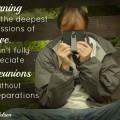Two quotations are in the hearts of members of The Church of Jesus Christ of Latter-day Saints believing that this life is about having joy. One comes from the Book of Mormon: “Adam fell that men might be, and men are, that they might have joy” (2 Nephi 2:25). The other is a statement from the Prophet Joseph Smith, the first president of The Church of Jesus Christ: “Happiness is the object and design of our existence, and will be the end thereof, if we pursue the path that leads to it” (Teachings of the Prophet Joseph Smith, comp. Joseph Fielding Smith (Salt Lake City: Deseret Book, 1938), 255.).
But the two quotations represent a paradox, because life is not trouble free. How do you feel joy or happiness when you experience adversity?
When I was going through an acute trial in my life many years ago, a friend said to me, “You’re being spiritually refined. So don’t resent it.” His counsel had a profound effect on me. I no longer saw what I was going through as arbitrary or destructive. I knew I could come through my ordeal a stronger, wiser person. Rather than feel that my Heavenly Father had rejected me or forgotten me, I felt closer to Him. I felt Him teaching and helping me. I felt His love and His attention. And I actually felt protected by Him. I could separate myself from the experience: I was not the pain I was going through; but I could use the pain to grow.
Elder Richard G. Scott said, “Sadness, disappointment, and severe challenge are events in life, not life itself.” He also said that we are here on the earth “for a divine purpose. It is not to be endlessly entertained or to be constantly in full pursuit of pleasure.”
Opposition In Life
The Book of Mormon teaches that “there must needs be, that there is an opposition in all things” (2 Nephi 2:11). When we know sickness, we better appreciate when we are well. When we are without enough money for our needs, we appreciate more when we have plenty.
Terryl and Fiona Givens explain this opposition: “As surely as the dark gives meaning to the dawn, so does pain give meaning to pleasure, and sorrow to joy. All that we love, all that we strive for, all that we relish, we know only by contrast” (Terryl Givens and Fiona Givens, The God Who Weeps: How Mormonism Makes Sense of Life ([Salt Lake City]: Ensign Peak, 2012), 33.).
“Come What May, and Love It”
Elder Joseph F. Wirthlin said that when he was young, he sometimes expressed disappointments to his mother and she often told him, “Come what may, and love it.” Applying her counsel throughout his life, he learned:
In spite of discouragement and adversity, those who are happiest seem to have a way of learning from difficult times, becoming stronger, wiser, and happier as a result. . . . If we approach adversities wisely, our hardest times can be times of greatest growth, which in turn can lead toward times of greatest happiness.
The apostle Paul expressed a similar understanding that he gleaned from his life:
I have learned, in whatsoever state I am, therewith to be content. I know both how to be abased, and I know how to abound: every where and in all things I am instructed both to be full and to be hungry, both to abound and to suffer need. I can do all things through Christ which strengtheneth me (1 Philippians 4:11–13).
Choosing Joy
Joy and happiness, then, become a choice for each of us. There are times when joy is easier to feel, but it is possible under any circumstance.
Both abundance and lack [of abundance] exist simultaneously in our lives, as parallel realities. It is always our conscious choice which secret garden we will tend . . . when we choose not to focus on what is missing from our lives but are grateful for the abundance that’s present—love, health, family, friends, work, the joys of nature, and personal pursuits that bring us [happiness]—the wasteland of illusion falls away and we experience heaven on earth. (Sarah Ban Breathnach in John Cook, comp., The Book of Positive Quotations, 2nded. (2007), 342, as quoted in Thomas S. Monson, “Finding Joy in the Journey, Ensign, November 2008.)
Actions that Foster Joy
From that difficult experience almost twenty years ago till now, I have discovered activities that bring me joy, almost instantly:
Gratitude. Whether I write a thank you card, make a list, or express thanks in prayer to Heavenly Father, daily expressions of gratitude help me see my abundance and recognize goodness all around me. The more I express, the greater my joy.
Service. The late President Gordon B. Hinckley, late president of The Church of Jesus Christ, said that when he felt like giving up on his full-time proselyting mission in England, his father advised him to “Forget yourself and go to work.” Any time I set aside my problems and go do something for someone else, I feel joy. Sometimes the service is simply smiling at someone. Sometimes it is helping someone with a difficult task. Whatever I do for someone else, service is always a balm.
Creation. Any time I create something, I feel joy. One year I felt like my life was drudgery and all I accomplished was going to work every day. I decided to start sewing so that I could look back on the year and see tangible evidence that I had done more than make a living. It was a very fulfilling year. Other acts of creation— such as gardening, painting, writing, or cooking—help me feel joy.
Prayer. The apostle Paul said it well when he said “I can do all things through Christ which strengtheneth me.” Praying to Heavenly Father for guidance and comfort has consistently helped me. Connected to praying is making an effort to do the will of God, which included obeying His commandments and trying to live a good life.
At the end of a long life, full of marriage, children, military service, work dedicated to the study of ancient civilizations and languages, travel, and professional accolades, an acquaintance said at the end of his life that he had figured it out: Life is all about joy. He was right. Life is about joy—finding it, creating it, sharing it, and thanking God for it.






